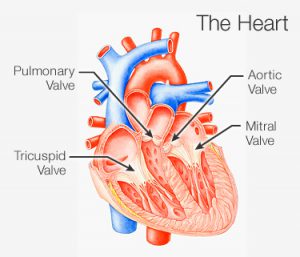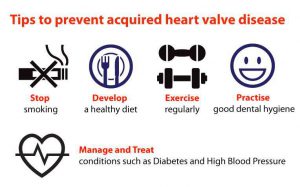
What is Heart valve disease (HVD)?
Valvular heart disease is characterized by damage to or a defect in one of the four heart valves:
- mitral
- aortic
- tricuspid or pulmonary.
The mitral and tricuspid valves control the flow of blood between the atria and the ventricles (the upper and lower chambers of the heart).

HVD can impact the body through:
- Strokes as sufficient blood will not be able to reach the brain, causing it to not to function properly
- heart failure as the heart won’t be able to pump enough blood to meet the bodyś need.
- death as strokes and heart failure might lead to death.
- blood clots as binding of platelets will cause the formation of clots which can block the pathway of blood anywhere in the body which can affect any organ. Example, if the clot is formed in the pathway of the brain, it will cause stroke as the brain won´t be able to get enough oxygen.
- Heart rhythm abnormalities- the pattern of the heartbeat can be abnormal.
TYPES OF HVD:
- Valvular Stenosis:
In valvular stenosis, the tissues forming the valve leaflets become stiffer, narrowing the valve opening and reducing the amount of blood that can flow through it.
2. Regurgitant Valve:
A regurgitant (incompetent, insufficient, or leaky) valve does not close completely, letting blood move backward through the valve.
HOW DO YOU KNOW THAT YOU ARE SUFFERING THROUGH HVD?
Echocardiography (echo) is the main test for diagnosing heart valve disease. But an EKG (electrocardiogram) or chest x-ray commonly is used to reveal certain signs of the condition. If these signs are present, echo usually is done to confirm the diagnosis of heart valve disease. HVD can also be diagnosed through Cardic MRI test, stress test, Chest X-ray, Cardiac Catheterization.

IMPACTS:
HVD impacts the nervous system as blood cloting takes place in the nervous system. People suffering from HVD usually have a very low emotional status as they know that HVD last for their whole life, but some people accept that fact and move on in their life.
TREATMENTS: HVD can
IMPLICATIONS:
Economic factor- heart transplants cost a lot of amount (7 lakh). Not all people can afford heart transplants.
Cultural factor- Important misconceptions about transplants and fears are fear of death, the belief that removal of organ violates the sanctity of decreased, concern about being cut up after death, desire to be buried whole, a wrong concept of brain death, and the idea of the donation being against religious conviction.
Ethical factor– Creating a biological valve for valve replacement requires parts from animals and many people believe it is unethical to kill an animal to help a human, using animals to improve healthcare has been protested before.